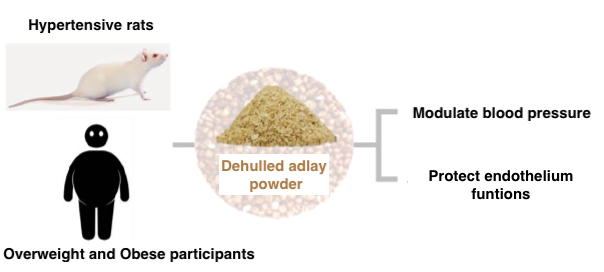Eating Dehulled Adlay Every Day Helps Your Blood Pressure
(Provided by Assistant Professor Wan-Ju Yeh and her team from the Undergraduate and Graduate Programs of Nutrition Science)
High blood pressure is a crucial risk factor for many cardiovascular diseases, and a diet rich in whole-grain foods may modulate blood pressure. This study investigated the effects of dehulled adlay consumption on blood pressure and endothelium functions, and discovered that it could retard blood pressure increases over a 12-week experimental period in hypertensive animals. In an additional human trial, 23 participants with overweight and obese-consumed 60g of dehulled adlay daily for a six-week experimental period, and exhibited a significant decrease in systolic blood pressure (SBP). The change in SBP was even more evident in participants with high baseline SBP. A daily intake of 60g of dehulled adlay is therefore suggested as a replacement over some staple foods as it delivers beneficial effects for blood-pressure management.
Hypertension is associated with mortality and morbidity related to various cardiovascular diseases. Long-term high blood pressure may lead to impaired cardio and kidney functions. According to the American College of Cardiology/American Heart Association (ACC/AHA) 2018 Guideline for the Prevention, Detection, Evaluation, and Management of High Blood Pressure in Adults, adults with systolic blood pressure (SBP) and diastolic blood pressure (DBP) above 130 and 80 mmHg, respectively, were defined as having hypertension and thus are encouraged to take regular antihypertensive medication and to implement lifestyle modifications such as adherence to the Dietary Approaches to Stop Hypertension (DASH) recommendations—whole grains rather than refined grains, fruit and vegetables, and low-fat dairy products.
Dehulled adlay, a local Taiwanese crop that contains bran, is an unrefined whole grain and is therefore richer in fiber, minerals, and vitamins compared to refine adlay. Recent studies have also reported that adlay bran, which is rich in phenolic compounds, has beneficial effects on lipid metabolism and inflammatory responses in vivo. To understand the effects of dehulled adlay on blood pressure management, this study employed both an animal trial and a human trial to prove our theory (Figure 1). In the animal trial, spontaneously hypertensive rats were fed 12% and 24% adlay powders during a 12-week experimental period. The results demonstrated a reduction in systolic blood pressure in the groups consuming dehulled adlay compared to the group without adlay in the diet. In addition, ET-1 levels in the dehulled-adlay-consuming groups were found to be significantly lower than those in the non-dehulled-adlay-consuming groups.
Seeing the positive results of dehulled adlay in animal trials, the research team later recruited 23 overweight and obese participants who consumed 60g of dehulled adlay daily for a six-week experimental period. At the end of the study, a significant decrease in the group’s systolic blood pressure (SBP) was observed, and the change in SBP was even more evident in participants with high baseline SBP. In conclusion, the results suggest that daily intake of dehulled adlay indeed has beneficial effects in blood-pressure management. By cooking dehulled adlay with rice or adding its powder into milk or soy milk, you may find that having an adlay-rich diet is quite achievable!

Figure 1: Dehulled adlay is a local Taiwanese whole grain crop, the intake of which has beneficial effects for lipid metabolism and inflammatory responses
Source: Yeh, W. J., Ko, J., Cheng, W. Y., & Yang, H. Y. (2021). Dehulled Adlay Consumption Modulates Blood Pressure in Spontaneously Hypertensive Rats and Overweight and Obese Young Adults. Nutrients, 13(7), 2305. https://doi.org/10.3390/nu13072305
Wan-Ju Yeh’s fields of research include dietary factors of kidney and liver diseases as well as obesity. Her laboratory focuses on mouse models and human trials to understand the effects of nutrients and compounds on pathology and metabolism.


